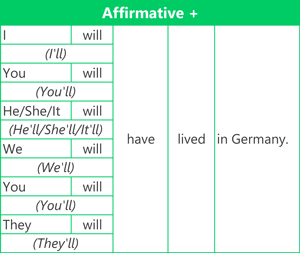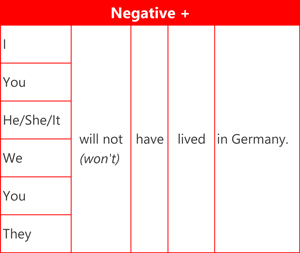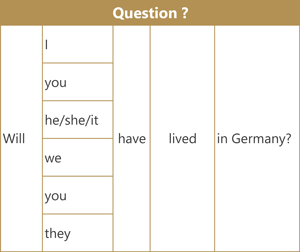What is the future perfect simple?
The future perfect simple is one of the English verb tenses.
You can learn more English online by visiting our free English grammar lessons, which include other verb tenses and more grammar points.
You can also find more grammar, vocabulary and communication tasks for each English level:
Use & examples |
The future perfect simple tense refers to 'the past in the future' and we use it to describe:

(1) Past in the future
It describes actions or situations that are expected be completed/finished before another time in the future.
- I'll have finished (1) my book by Saturday (2).

(2) Predictions about the present
It can be used to describe something that we think has already happened at the moment of speaking.
- He'll have left the office already.
Form |
How do you write and pronounce the future perfect simple?
Form: Key points
- Use the auxiliary verb 'will' + have + main verb (Past participle).
- To form the past participle of main verbs, add 'ed' to the base form of the verb, which is the infinitive without 'to'.
Here are examples of the affirmative (positive) form, negative form and question form using the verb 'live'.


Contractions
It is also possible to contract subject pronouns with auxiliary verb + 'not'
- I'll not have
- He'll/She'll/It'll not have

Short answers
- Yes, I will. / No, I won't.
- Yes, you will. / No, you won't.
Pronunciation
We commonly use contractions (e.g. 'I'll have met friends' or 'He won't have worked') for the future perfect simple tense, especially when speaking English.
The future perfect simple with 'ed' has three different pronunciation sounds.
- /t/ (e.g. worked, helped) - when 'ed' comes after an unvoiced consonant sound.
- /d/ (e.g. stayed, lived) - when 'ed' comes after a voiced consonant or a vowel sound.
- /ɪd/ (e.g. started, decided) - when 'ed' comes after the sounds /t/ and /d/.
Notes |
For the future perfect simple, we have extra information about:
- spelling exceptions for verbs and
- time expressions that you can use.
Spelling exceptions for verbs
The past participle for regular verbs is the same as the past tense form and ends with 'ed'.
Sometimes we need to remove a letter, and other times we need to add another letter. Here are the exceptions:
1) One 'e' at the end of a verb
Add 'd' at the end of the base form.
Examples:
[live] I will have lived in Germany for two years.
[save] I won't have saved money for a new car.
2) Verb ends with consonant + one stressed vowel + one consonant
Double the final consonant before -ed'.
Examples:
[stop] I 'll have stopped smoking.
* Verbs ending with an unstressed vowel
These follow the normal rules, and the last consonant is not doubled.
Examples:
[develop] They'll have developed a new idea at the company.
3) Verb ends in 'l' (British English)
Double the final consonant before -ed'.
Examples:
[travel] I'll have travelled the world with friends.
4) Verb ends with 'ic'
Add 'k' before -ed'.
Examples:
[panic] He'll have panicked about the exam.
5) Irregular verbs
There are many irregular verbs which don't follow the rules and you just need to remember them!
Examples:
[see] He'll have seen the film.
Time expressions used with future perfect simple
Time markers can be used with the future perfect simple and connect (or relate to) two different times in the future.
1) for
This connects a period of time in the future to a later time in the future.
Examples:
I'll have worked at this company for six years (at Christmas).
2) by / by the time / when
This is used when something happened before (not later than) a specific time in the future.
Examples:
By 4 o'clock, he'll have finished all his emails.
By the time he leaves today, he'll have finished all his emails.
I'll have already worked at this company for two years, when I get married.
3) already
This shows that something will finish earlier than another event in the future.
Examples:
She'll have already gone home (when we arrive at the party).
4) before
This can be used to emphasis the sequence of events in the future.
Examples:
The film will have finished before we have dinner.
Quizzes |
Quiz 1: Things that expected to be completed before another time in the future
A new government has been elected and a reporter discusses future targets with a key politician.
[Topic: Global issues]
Type the verbs in the future perfect simple tense and use the affirmative, negative or question form.